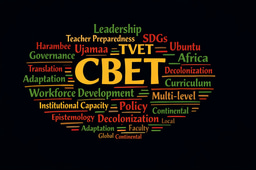Strategies for developing sustainable communities in higher education institutions
Published in Sustainability

Pope Francesco calls for the promotion of "a new kind of education, one that allows us to overcome the current globalisation of indifference and the culture of waste". The literature has shown that the factors most conducive to sustainable education vary from country to country, but the development of a green culture appears to be a common driver. Today's challenges are complex and require a simultaneous commitment of resources and skills that can grasp the dynamism of events and propose resilient solutions. Sustainable education together with trust in young people are the pillars to build the future of a civil society. The projection to the future, in order to offer at least the same opportunities to future generations, can only concern the place where young people are formed humanly and professionally. Institutions of higher education, based on learning, innovation and research, are called upon to renew themselves and to offer appropriate solutions, highlighting how knowledge can be the driving force behind a country's development.
This is a message to all colleagues to integrate the 17 Sustainable Development Goals into their studies, focusing on specific competences but also favouring integration at an interdisciplinary level. Our study involved engineering students at an Italian university on an energy management course with a syllabus characterised by sustainability-based content. In particular, a questionnaire was proposed at the beginning and end of the course to assess how the teaching content influenced the students. The results confirm that a university course is capable of increasing sustainable knowledge, but can also trigger a strong curiosity in the younger generation to learn more about these issues. The involvement of students, seminars conducted by experts, the development of projects that were monitored in their development phase, autonomy in the choice of topic and methodological approach made it possible to achieve this result. This choice certainly requires additional time for teachers, but the quality of teaching cannot know any time limits. Students' needs and curiosities must be placed at the centre of this process. Two aspects were also highlighted. The first is the ability of such an approach to capture the attention of students, enabling an increase in the number of those taking a sustainability-oriented course, promoting problem-solving skills and a culture of continuous improvement. The second is that a long-term relationship is established in which it is common for such projects to be the subject of further growth and thus to be explored in depth in a thesis work, thus generating the basis for a long-term collaboration. A passion for what is taught must be passed on to the younger generation.
Further implications emerging from this study indicate that sustainable communities in academia are based on six fundamental pillars: i) sustainable education, ii) energy (and resource) independence, iii) subsidies to support the green economy, iv) initiatives to reduce the carbon footprint, v) energy community development and vi) new green professional opportunities. The authors of the study also point out that four resources are found to be strategic for the realisation of a sustainable community within the university: (i) interdisciplinarity, (ii) pragmatism, (iii) altruism and (iv) trust in young people.
This study also wants to make a political suggestion with an eye on future European elections. Sustainability is fortunately no longer a topic for the few and attracts the attention of many categories of stakeholders. Sometimes ideological solutions do not seem to be able to grasp the three dimensions of sustainability (environmental, economic and social) and a pragmatic view seems to be more desirable. Sustainability is the concrete resolution of problems through a shared approach based on stakeholder engagement, maintaining a balance between ecosystems. Thus, a potential political initiative also emerges, which we hope will be realised. Sustainability courses are a great opportunity that should also be addressed to those who have decided to discontinue their studies, and European/national funds could be allocated in this direction. Even then, participants would be asked to carry out a project and thus would not just be asked to listen to lectures. University students themselves could be their tutors in order to create a cross-fertilisation of ideas. Are you ready for this change?
The generation that experienced World Youth Day in 2000 has a task assigned to them by Pope Giovanni Paolo II: "to defend life at every moment of its earthly development and to strive with their own energy to make this earth more and more habitable for all".
Follow the Topic
-
Scientific Reports

An open access journal publishing original research from across all areas of the natural sciences, psychology, medicine and engineering.
What are SDG Topics?
An introduction to Sustainable Development Goals (SDGs) Topics and their role in highlighting sustainable development research.
Continue reading announcementRelated Collections
With Collections, you can get published faster and increase your visibility.
Reproductive Health
Publishing Model: Hybrid
Deadline: Mar 30, 2026
Women’s Health
Publishing Model: Open Access
Deadline: Feb 28, 2026






Please sign in or register for FREE
If you are a registered user on Research Communities by Springer Nature, please sign in